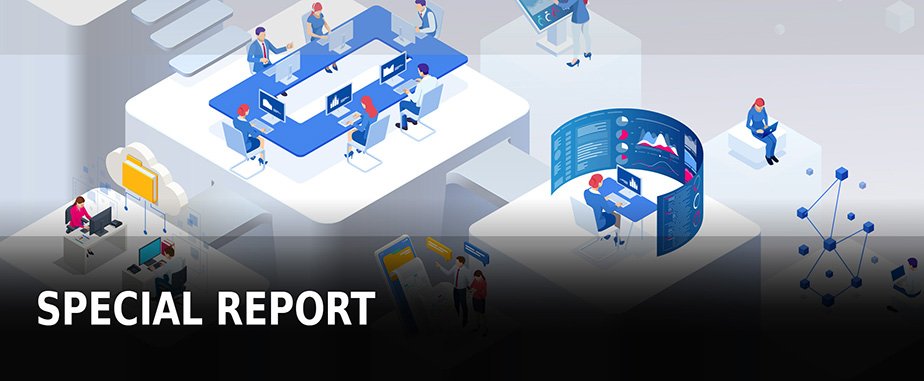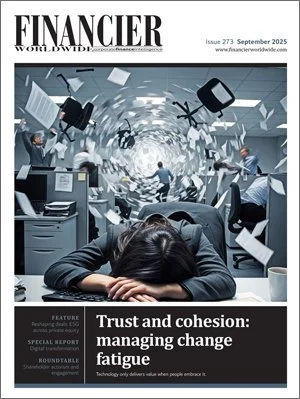Reimagining work in an AI-enabled world: adaptability as a strategic imperative
September 2025 | SPECIAL REPORT: DIGITAL TRANSFORMATION
Financier Worldwide Magazine
The modern knowledge worker begins their day not with clarity, but with overwhelm. They log into a cascade of applications, only to be met with dozens of emails, overlapping meetings and fragmented requests from systems not designed to communicate.
Focus becomes fleeting, and moments for deep work are wedged between back to back video calls. In this digitally saturated environment, productivity is measured in outputs, yet workers quietly question their relevance.
This is the state of knowledge work today – a landscape defined more by disruption than direction. The convergence of new technologies, especially artificial intelligence (AI), is accelerating this complexity. While some leaders remain focused on efficiency metrics, the real opportunity lies in rethinking what work is, how it is done and where it happens.
To navigate this shift, organisations must adopt a fundamentally different mindset – one rooted in adaptability. This emerging capability is not just about resilience; it is the key to unlocking AI’s full potential in transforming workers, work and the workplace.
From disruption to enablement
Work has continually evolved alongside technological innovation. During the industrial era, knowledge work primarily consisted of administrative tasks. The information revolution ushered in an era of specialisation, analytical thinking and global connectivity. The arrival of mobile computing and cloud collaboration redefined the pace and structure of modern roles.
Today, AI is poised to become the next great transformer. According to the International Monetary Fund, nearly 40 percent of global employment is exposed to AI, meaning those roles include tasks that could be augmented or automated.
Some workers will benefit, gaining decision support and increased efficiency. Others may face displacement or role redefinition. A recent analysis by Goldman Sachs estimated that up to 300 million jobs worldwide could be exposed to AI-led automation.
Despite this sweeping potential, many companies are unprepared. Our research, in collaboration with Oxford Economics, shows that enterprise AI maturity actually declined year over year, suggesting either a stall in progress or a recalibration of what AI maturity really requires. The gap between promise and preparedness has never been wider.
Yet history shows that periods of disruption often generate new categories of employment, innovation and economic opportunity. The challenge for leaders today is to shift AI from a source of anxiety into a tool of enablement – reframing it not as a substitute for human effort, but as an amplifier of human potential.
The role of adaptability
Adaptability has quickly emerged as a defining skill for the post-digital workforce. The World Economic Forum ranks it among the most critical capabilities for 2030. But this is not adaptability in the abstract – it is concrete, measurable and increasingly tied to business competitiveness.
Rigid job descriptions are giving way to dynamic, skill-based models. Teams form and dissolve around evolving priorities and individuals must learn to ‘surge skill’ – that is, learning new tools quickly, applying them rapidly and adapting continuously. The future of work is not about mastering a fixed set of knowledge. It is about remaining relevant as knowledge itself changes.
Forward-looking companies are responding accordingly. Bayer, for example, is restructuring its operations to adopt a ‘dynamic shared ownership’ model, flattening management layers and empowering cross-functional teams to operate with greater autonomy. Decision making is moving closer to customers, and roles are being defined less by hierarchy and more by contribution. Such organisational models require workers who can work alongside AI – not just using it, but coordinating and co-piloting with it.
Transforming the nature of work
AI is reshaping the nature of work itself. Generative tools such as large language models are already automating low-value tasks like summarisation, search and repetitive communications. But the deeper shift lies in what this frees workers to do: focus on strategy, creativity, empathy and judgement – tasks that remain uniquely human.
AI can also spark innovation by connecting ideas that previously lived in organisational silos. It can pair customer problems with product solutions, identify insights across datasets and suggest novel approaches to persistent challenges. In this way, AI becomes more than a time-saver, it becomes a thought partner.
This transformation is visible in sectors like healthcare and education. At recent industry conferences, medical leaders showcased AI models that detect disease earlier than clinicians, enabling faster and more personalised care.
In education, adaptive learning systems are tailoring instruction to individual students’ pace and style, helping unlock potential at scale. These examples reveal a broader truth: AI is not just making existing work faster, it is enabling entirely new kinds of work.
Reimagining the workplace
Just as roles and workflows are evolving, so too are the environments where work happens. The return to office debate remains contentious. A 2024 survey by ResumeBuilder found that eight in 10 employers had lost talent due to rigid in-office mandates. Rather than boosting performance, these policies often erode trust and cultivate a culture of visibility over value.
Leading companies are redefining physical workplaces to better support hybrid models. Dropbox, for instance, has adopted a ‘virtual first’ model, converting traditional offices into collaborative studios for moments that benefit from co-location. Meanwhile, Accenture is leveraging digital twin simulations to optimise office layouts, energy use and collaboration patterns based on real-time behaviour.
These initiatives reflect a larger trend: physical space is no longer just a container for work; it is an active participant in how work gets done. When offices flex around people’s needs – supporting both in-person connection and remote autonomy – they become assets for engagement, not obligations to enforce.
A maturity framework for AI-enabled transformation
To help organisations assess their readiness for the post-work era, a simple framework can be helpful across three key organisational functions: building, selling and servicing.
In early stages, AI awareness may be limited to experimental use of chat tools or coding assistants. As maturity progresses, teams begin integrating AI into workflows, developing internal guidance and testing new applications with human oversight. At the highest levels, AI is embedded into core processes, with employees orchestrating agents, interpreting AI-driven insights and focusing on complex problem solving.
The shift from digital-first to AI-native is not just about adoption – it is about evolution. Empowered workers, insight-driven work and dynamic workplaces form the new blueprint. And at the heart of it all is adaptability: the connective tissue that enables resilience, reinvention and long-term success.
Conclusion: authoring the future of work
The conversation around AI and work often begins with fear. What will be lost? Who might be left behind? But a more productive lens is to ask what might be gained. What if this transition is an invitation – not just to automate tasks, but to reimagine value? To build more human-centred, creative and adaptable organisations?
The post-work era does not signal the end of employment; it marks a new beginning – one where human ingenuity is not diminished by machines, but elevated by them. For those willing to lead with adaptability, the future is not something to endure; it is something to author.
Spencer Beemiller is an Americas innovation officer at ServiceNow. He can be contacted on +1 (925) 413 4431 or by email: spencer.beemiller@servicenow.com.
© Financier Worldwide
BY
Spencer Beemiller
ServiceNow
Q&A: AI and digital transformation in healthcare & life sciences
Reimagining work in an AI-enabled world: adaptability as a strategic imperative
Humans and machines in the enterprise – work but not as we know it
Key managerial requirements for AI-based business transformations
Digital transformation as a strategic driver of online reputation
EU financial firms: digital and legal challenges


